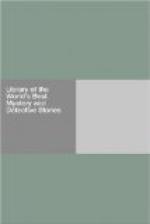Ah! the vulture has eaten the pigeon, the wolf has eaten the lamb; the lion has devoured the buffalo with sharp horns; man has killed the lion with an arrow, with a sword, with gunpowder; but the Horla will make of man what we have made of the horse and of the ox: his chattel, his slave and his food, by the mere power of his will. Woe to us!
But, nevertheless, the animal sometimes revolts and kills the man who has subjugated it.... I should also like ... I shall be able to ... but I must know him, touch him, see him! Learned men say that beasts’ eyes, as they differ from ours, do not distinguish like ours do ... And my eye cannot distinguish this newcomer who is oppressing me.
Why? Oh! Now I remember the words of the monk at Mont Saint-Michel: “Can we see the hundred-thousandth part of what exists? Look here; there is the wind which is the strongest force in nature, which knocks men, and blows down buildings, uproots trees, raises the sea into mountains of water, destroys cliffs and casts great ships onto the breakers; the wind which kills, which whistles, which sighs, which roars—have you ever seen it, and can you see it? It exists for all that, however!”
And I went on thinking: my eyes are so weak, so imperfect, that they do not even distinguish hard bodies, if they are as transparent as glass!... If a glass without tinfoil behind it were to bar my way, I should run into it, just as a bird which has flown into a room breaks its head against the window panes. A thousand things, moreover, deceive him and lead him astray. How should it then be surprising that he cannot perceive a fresh body which is traversed by the light?
A new being! Why not? It was assuredly bound to come! Why should we be the last? We do not distinguish it, like all the others created before us. The reason is, that its nature is more perfect, its body finer and more finished than ours, that ours is so weak, so awkwardly conceived, encumbered with organs that are always tired, always on the strain like locks that are too complicated, which lives like a plant and like a beast, nourishing itself with difficulty on air, herbs and flesh, an animal machine which is a prey to maladies, to malformations, to decay; broken-winded, badly regulated, simple and eccentric, ingeniously badly made, a coarse and a delicate work, the outline of a being which might become intelligent and grand.
We are only a few, so few in this world, from the oyster up to man. Why should there not be one more, when once that period is accomplished which separates the successive apparitions from all the different species?
Why not one more? Why not, also, other trees with immense, splendid flowers, perfuming whole regions? Why not other elements besides fire, air, earth and water? There are four, only four, those nursing fathers of various beings! What a pity! Why are they not forty, four hundred, four thousand! How poor everything is, how mean and wretched! grudgingly given, dryly invented, clumsily made! Ah! the elephant and the hippopotamus, what grace! And the camel, what elegance!




